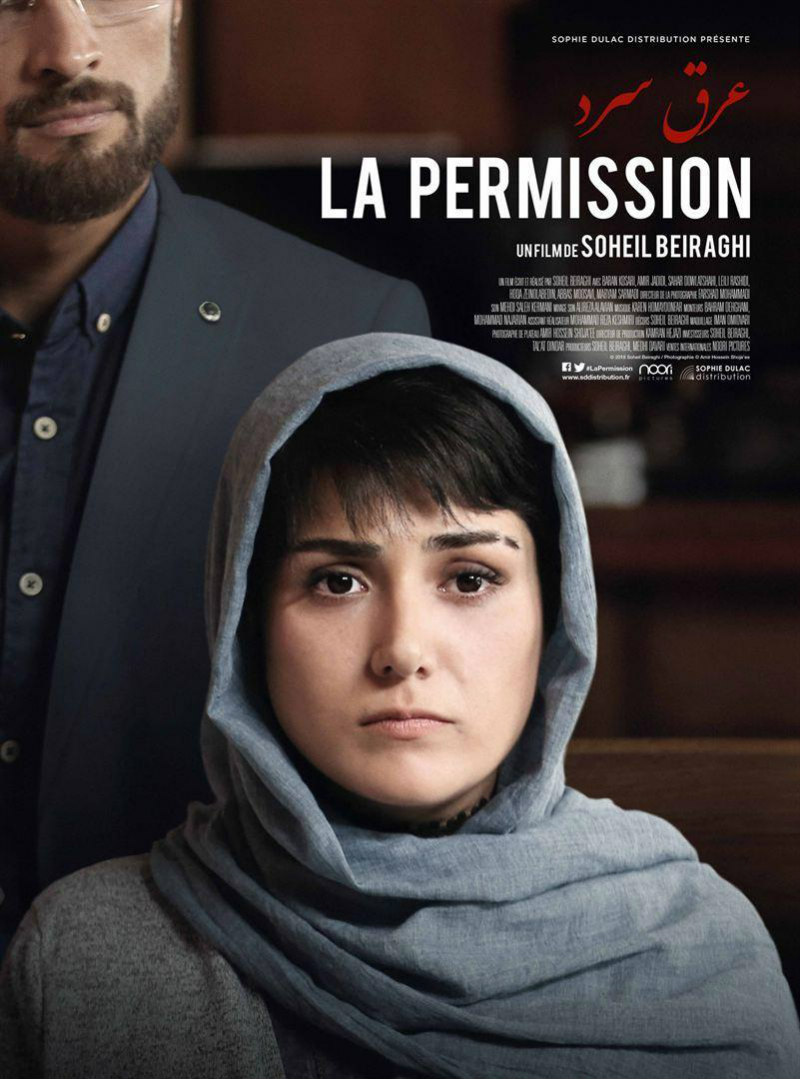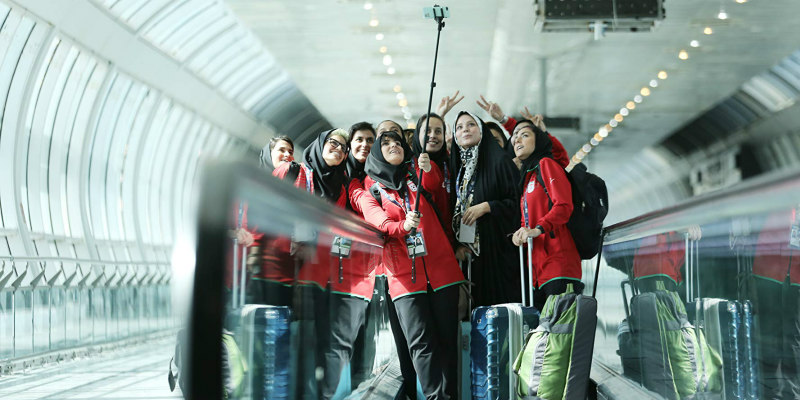
An Iranian Futsal player is denied her husband's permission to attend an international tournament.
Review by Benjamin Poole
Directed by: Soheil Beiraghi
Starring: Baran Kosari, Amir Jadidi, Leili Rashidi, Hoda Zeinolabedin, Sahar Dolatshahi

Permission, Soheil Beiraghi’s social drama, opens with a big ugly close up of a pair of feet. These are not Tarantino-esque idealised extremities: these hoofs are gnarly, the feet of an athlete. The inference is confirmed when the camera cuts back, and we see the toned morphology of the rest of the body while the owner prepares for a football match. Still swathed in elusive shadows, the assumption (based on decades of patriarchal dominance) is that it’s a fella we’re watching get ready. But -ahhhhhh!- we then cut to the rest of the team and the ensuing match - an energetic Futsal tournament - and it turns out we’ve been watching a lady football player. The team is the National Iranian female side, and, what’s more, following a fast and furious montage, they’ve won! The international final, and Malaysia, beckon!


Prior to the match, we are privy to the locker room banter of the changing rooms: no motivational pitches here, just reminders to keep hair within headscarves and ensure no skin is on display. And the match itself is ace. Representing sport in film is always tricky: sport is a transaction which, by its very essence of chance and skill, creates spontaneous spectacle, rather than film’s realisation of pre-ordained plot beats. With its dense construction, narrative cinema is the opposite of sport, but Beiraghi complies with sport’s natural rhythms by allowing his cast to play and simply filming the matches in quick transitions of medium shots and close ups, which present the full on energy and aggression (and occasional clumsiness) of the teams as they compete. I can’t bear football IRL but even I was completely engaged. And, along with the playful bait and switch of the opening preceding this fun, exciting representation of football, I settled in, ready for a knockabout light-hearted drama about the Iranian female Futsal team conquering not only the world but cultural assumptions, too.
[ READ MORE: New Release Review - Judy & Punch ]
But then Permission takes a different turn: when our girl Afrooz (Baran Kosari) steps through customs en route to Malaysia, she’s prevented from passing because her husband has not given her permission of movement, which, in Iran, is a legal prerequisite for women looking to travel overseas. Concurrently, in a stroke of narrative cunning, what Beiraghi does is rob us of the film we were conditioned to expect, and which, if all was well and just, the triumphant narrative Afrooz should have been starring in. We don’t see any more sport from this point on, as the film instead focuses exclusively upon the low-key turmoil of Afrooz interacting with her estranged husband Yaser (Amir Jadidi) and her varied attempts to try to get him to change his mind. Fat chance. Yaser has the weight of enshrined law and cultural hegemonies on his side, and the bitterness and bruised masculine pride with which to fully enact both.


Intriguingly, Yaser is a religious talk show host (think the slick insincerity of lunchtime telly) and as such has a social standing which adds further weight to his decisions. The manner of how Beiraghi plots the interactions between the two ex-lovers is fascinatingly genteel. It’s clear that this is one match the sporting ace Afrooz cannot win with the sort of aggression and tactics she employs on the field, and so she is reduced to cajoling Yaser and suffering endless, fruitless meetings with counsellors and solicitors.
[ READ MORE: New Release Review - The Nightingale ]
Around the end of the second act it transpires that Afrooz is the subject of a sympathetic social media campaign. Now, a lesser film maker would have perhaps made this the focus of the film going forward, but Beiraghi has an absolute commitment to the intimacy of his performances and, ultimately, to the bleak truth of the situation (a credits intertitle informs us that in 2017 eight Iranian sportswomen were refused travel rights by their husbands, for fuck's sake). Social media can’t help really, and so that’s that (a sly dig at the vacuity of keyboard warriors from this quietly angry film?). Afrooz’s situation unfolds excruciatingly, like in an agonisingly sad sequence halfway through the film wherein her flash prick of a husband has her turfed out of her rented accommodation, and she returns home to her furniture and belongings on the pavement outside. The camera observes silently as she roots about in the domestic detritus until she, eventually, locates her trophies; the only objects she takes away with her.

However, nothing is morally simple in this adult film. While Yaser may well be a flash prick, there is the potentially mitigating fact that he is still in love with his wife, and, more than anything else, wants her back. This doesn’t excuse his actions, but, as Mr. Poe says, we are insane only when our hearts are touched, and Permission does its best to understand his twisted humanity. Likewise, the (female administered) establishment which is in charge of women’s sports is as culpable, more concerned about the sort of image the perceived waywardness of Afrooz is projecting than the security of their star player. When Afrooz’s institutional defenders make her case, it is always national pride which is at stake, and not the equal rights of an individual: the game is rigged and the uncomfortable truths within Permission linger far longer than the final whistle.
Permission is in UK cinemas November 22nd.
"An honest and heartfelt portrayal of working class life, one that never condescends to or patronises its characters."— 𝕋𝕙𝕖𝕄𝕠𝕧𝕚𝕖𝕎𝕒𝕗𝕗𝕝𝕖𝕣.𝕔𝕠𝕞 🎬 (@themoviewaffler) November 11, 2019
SUPPORT THE GIRLS is on #Netflix UK now.
Read @hilliseric's reviewhttps://t.co/6vFuUkoj30 pic.twitter.com/usMM0nCcH1


